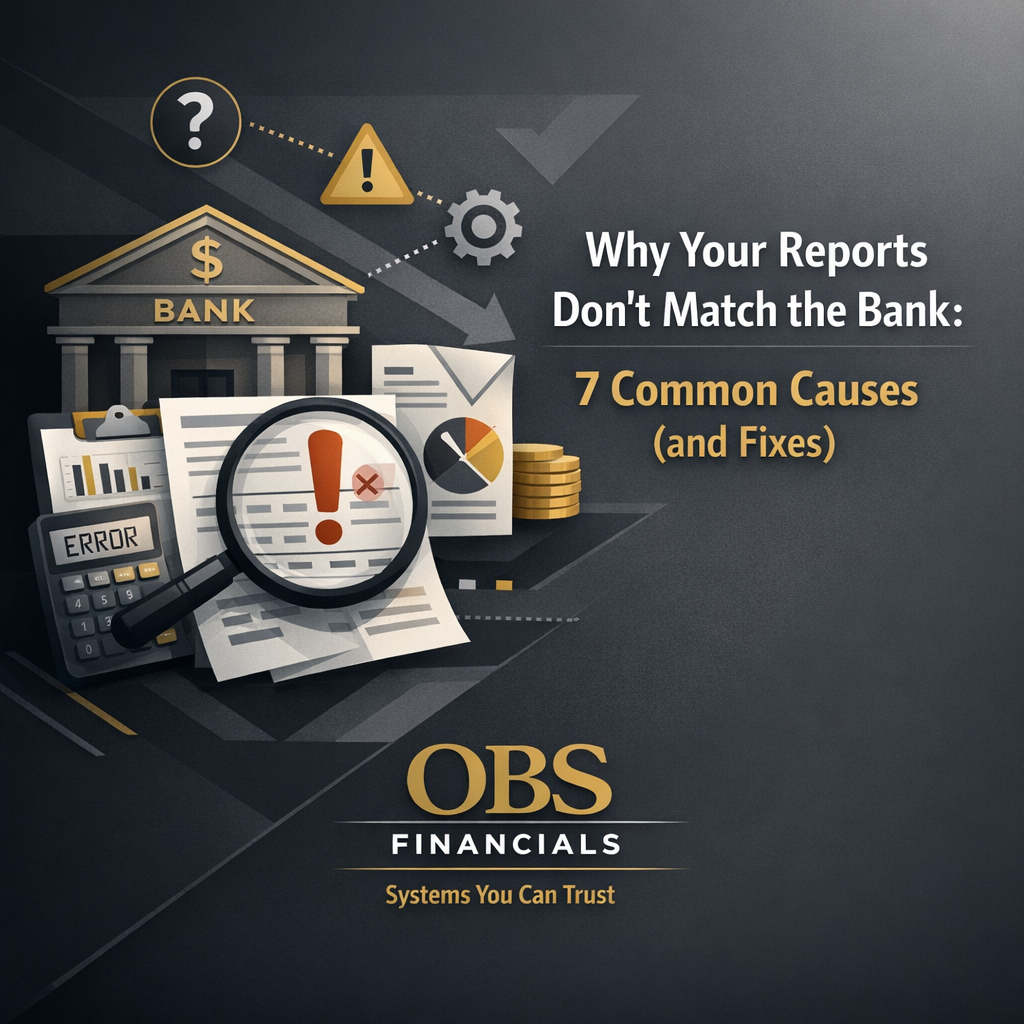Financial Cleanup 101: Essential Guide for Small Business Owners
Understanding Financial Cleanup
Why Financial Health Matters for Small Businesses
Today, running a small business can feel like juggling multiple tasks at once. Business owners jump from marketing to sales to customer service, and sometimes they forget about something super important: their financial health. Keeping your finances stable is crucial since it affects everything about your business, from day-to-day operations to future growth.
Take Jane, for example. She opened a cozy coffee shop because she loved roasting beans and serving up great coffee. But as customers poured in, Jane neglected her bookkeeping. Before long, she was swamped with unpaid bills and cash flow problems. Her experience shows just how key it is to stay on top of your finances in any small business.
Key Reasons to Focus on Financial Health
- Running Smoothly: Keeping your finances in check means you can keep things running without a hitch. You’ll be able to pay your suppliers on time, which keeps those relationships strong and avoids any hiccups.
- Growth Planning: If you don’t have a good handle on your finances, making plans to grow can get messy. Being financially healthy helps you make smart decisions about expanding, hiring, and what products to offer.
- Handling Crises: Markets can be unpredictable. Whether it’s a pandemic, a downturn in the economy, or shifts in what customers want, a solid financial plan gives you a cushion to tackle tough times without panicking.
- Getting Funding: Need a loan to grow or to cover costs when business is slow? Lenders want to see clear financial statements and proof that you manage money wisely before they’ll help you out.
- Building Trust: Investors and stakeholders want to back businesses that are financially savvy. Being in a strong financial position builds credibility and encourages trust from others.
So, understanding your financial health is really the backbone of a successful small business. Just like Jane learned the hard way, keeping an eye on your finances helps you avoid pitfalls and grab growth opportunities. Regular check-ups on your finances should be as routine as checking customer feedback or your stock levels. By making financial health a priority, small businesses can set themselves up for long-term success.
Assessing Your Current Financial Situation
Looking at Financial Statements
Recognizing the importance of financial health is just the start. The next step for small business owners is to take a good look at their current finances. This means reviewing financial statements, which give you a clear view of your business’s financial status.
Take Tom from a small fitness studio. He focused mainly on keeping clients happy and marketing but overlooked his financial statements. When he finally took a look, he found that his income was skewed and expenses were way higher than he expected. Not tracking these details led to some unwelcome surprises. To steer clear of issues like these, it’s important to check out these key financial statements:
- Balance Sheet: This gives a snapshot of your business’s assets, liabilities, and equity at a specific time. It shows how stable your finances are.
- Income Statement: It details your revenues and expenses over a specific period, helping you see if you’re making a profit and how efficiently you’re operating.
- Cash Flow Statement: This statement helps you understand how cash moves in and out of your business, which is key to meeting your obligations.
Checking these documents regularly gives you powerful insights into how well your business is running and helps inform your future decisions.
Spotting Problematic Areas
Once you’ve reviewed your financial statements, the next critical step is to figure out which areas need some attention. This often means digging into the numbers to spot trends and red flags. Here are some common issues to look out for:
- Declining Revenues: If your sales are consistently dropping, that could mean market shifts or marketing strategies aren’t working.
- Rising Expenses: If certain spending areas, like marketing or operations, are ballooning, this can chew away at profits.
- Cash Flow Problems: If you’re constantly having trouble meeting obligations, it’s a sign that cash isn’t flowing as it should.
For instance, when Tom dove deeper into his numbers, he realized that his marketing efforts weren’t yielding any return on investment. Focusing money on ineffective channels can lead to real financial strain over time. Making a list of these problem areas helps you prioritize the financial cleanup process so you can tackle the most urgent issues first. In short, thorough financial reviews set the stage for smart interventions to improve your business’s overall health.
Creating a Financial Cleanup Plan
Setting Clear Financial Goals
After figuring out your financial problems, it’s time to create a solid cleanup plan. The first step is to set clear financial goals that act as your roadmap for improvement and growth. Take Sarah, who runs a little bakery. After looking over her numbers, she knew she had to cut expenses and boost revenue. To face that challenge, she set some specific goals:
- Boost Revenue by 20% in Six Months: This goal was realistic based on past sales trends.
- Cut Overhead Costs by 15% by Year-End: Sarah planned to systematically analyze her operating expenses.
- Create a Savings Fund for Equipment: Having a dedicated fund helps Sarah plan for the necessary investments in her business.
By setting clear goals, Sarah was able to make decisions that aligned with what she wanted to achieve.
Tips for Setting Effective Financial Goals
- Be Specific: Vague goals won’t help you measure progress. Instead of saying “we need to save money,” clarify how much and by when.
- Make them Measurable: Use numbers you can track so you can assess and adjust as needed.
- Ensure they’re Achievable: Don’t set unrealistic goals that might just lead to frustration.
- Set a Timeframe: Deadlines create urgency and help prioritize what needs doing.
Prioritizing Financial Issues
Once you have your goals, it’s time to prioritize which financial issues to tackle. Not everything can get fixed at once, so focus on what needs attention first. For Sarah, prioritizing based on urgency and impact looked like this:
- Cash Flow Problems: This was a top concern since fixing it would allow her to pay bills and suppliers on time.
- Excess Inventory Levels: By cutting down waste and optimizing stock, Sarah could improve cash flow.
- Marketing ROI: Given her revenue goal, analyzing her marketing strategies was critical.
By prioritizing tasks methodically, business owners can create strategies that bring quick results while laying the foundation for future growth. A well-planned financial cleanup boosts clarity and lifts morale, paving the way for long-term sustainability in a competitive marketplace.
Implementing Your Cleanup Plan
Step-by-Step Guide to Tackling Debt
With clear goals in mind and problem areas prioritized, it’s time to put your cleanup plan into action. One big challenge many small business owners face is handling debt. A structured approach can help you gain control and move towards a stable financial future. Think about Alex, who runs a local landscaping business. After he noticed debt was a significant issue, he followed this step-by-step guide to address it:
- Look at Your Total Debt: First, Alex listed all his outstanding debts, including credit cards and loans. This gave him a clear picture of what he owed.
- Check Interest Rates: Knowing which debts had the highest interest helped Alex focus on paying those off first.
- Make a Payment Plan: He created a repayment strategy that funneled extra cash to high-interest debts while staying current on others.
- Explore Consolidation Options: By looking into consolidation loans, Alex found a way to combine multiple debts into one payment at a lower interest rate, making things simpler.
- Track Your Progress: Alex set up regular check-ins to see how he was doing and tweak his repayment strategy as needed.
Streamlining Expenses and Cutting Costs
After tackling his debts, another crucial step in Tom’s cleanup plan was to streamline expenses and reduce costs. This not only frees up cash but also strengthens long-term financial health. For Tom, strategies included:
- Conducting an Expense Audit: He reviewed his business expenses, categorizing them as necessary or unnecessary, which helped him spot potential cuts.
- Negotiating with Suppliers: Tom reached out to suppliers for better terms or bulk discounts, making use of long-term relationships for savings.
- Embracing Technology: Using software solutions for inventory management helped reduce labor costs and minimize waste.
- Checking Subscriptions: Alex looked for unused subscriptions and services that he could cancel to save money.
- Energy Efficiency Initiatives: Investing in energy-efficient equipment lowered his utility bills significantly.
By actively trimming expenses, businesses like Tom’s not only ease immediate pressure but also set themselves up for sustainable growth. Sticking to a cleanup plan can really transform the financial health of small business owners, helping them remain dynamic and resilient in a changing market.
Tools and Resources for Financial Management
Accounting Software Choices
Now that you have your cleanup plan, it’s time to equip yourself with effective tools and resources for financial management. One of the best assets is accounting software, which simplifies everything from bookkeeping to financial reports. Take Jessica, who owns an online store, for example. At first, she used spreadsheets for her finances, but found them unwieldy and prone to mistakes. Realizing she needed a better solution, Jessica explored various accounting software and was impressed by the positive change it brought. Here are some popular options you might consider:
- QuickBooks: Perfect for small businesses, it offers invoicing, expense tracking, and tax prep, alongside being user-friendly and compatible with many other tools.
- Xero: This cloud-based software is noted for its intuitive interface and strong reporting. It also has multi-currency support, great for those with international customers.
- FreshBooks: Tailored for service-based businesses, it focuses on invoicing, time management, and client communication.
- Wave: A budget-friendly option, this software provides solid accounting features for free, which works well for simple accounting needs.
With accounting software, Jessica saved time and improved her financial accuracy, allowing her to focus more on growing her business rather than getting caught up in paperwork.
Seeking Professional Assistance
While software is great, there may come a time when you find you need some expert help. Financial cleanup professionals can offer insights and strategies that go beyond what software alone can do. For instance, Mark, who owns a restaurant, was struggling with cash flow and profitability issues. Despite managing his finances better, he realized some situations needed specialized know-how. Here are some professional services to consider:
- Accountants: They can help with everything from bookkeeping to tax advice and financial analysis, providing peace of mind regarding compliance.
- Financial Advisors: These pros assist with long-term planning, investments, and retirement strategies, guiding you toward informed financial decisions.
- Business Consultants: Experts in operational improvements, they help identify ways to streamline processes, enhance profitability, and optimize resources.
In summary, investing in accounting software and getting professional help can take your financial management to another level. These resources empower small business owners to make better decisions, take control of their finances, and set up their ventures for sustainable growth.
Keeping an Eye on Financial Health
Setting Regular Financial Reviews
As small business owners act on their financial cleanup plans, it’s vital to have a system to monitor and maintain financial health. Regular reviews not only track progress but also confirm whether the strategies are working. Think about Maria, who runs a successful bakery. After implementing her financial plans, she knew establishing a routine for financial evaluations was essential. Maria decided to conduct monthly reviews, structured like this:
- Review Financial Statements: Every month, Maria checked her balance sheet, income statement, and cash flow statement. This helped her spot trends and catch any emerging issues early.
- Set Key Performance Indicators (KPIs): She defined key metrics, like gross profit margin and customer acquisition costs, to keep track of her financial goals consistently.
- Monitor Budget: Maria compared her actual expenses against her budget, helping her stay accountable and identify trimming opportunities.
- Adjust Forecasts: Based on her reviews, Maria would tweak her financial forecasts to align with current business situations.
Setting up such regular reviews turned Maria’s business into a proactive entity, allowing her to tackle challenges effectively.
Adapting Your Plan When Needed
No plan is ever perfect, and through her reviews, Maria figured out that adapting her financial strategy was essential for ongoing success. The business environment is constantly changing, so flexibility in financial management is vital. Here are some situations where you might need to tweak your plan:
- Market Changes: If customer behaviors shift or new competitors show up, it could be time to revisit your pricing or promotions.
- Unexpected Expenses: Things like equipment failure or supplier cost hikes can strain finances. Being open to reassessing your budget is critical.
- Growth Opportunities: If a great chance arises, like a perfect location for expansion or launching a new product, make sure your financial plan can accommodate those investments.
For Maria, being responsive to feedback during her reviews led to a seasonal promotion when her figures showed increased customer traffic. In a nutshell, maintaining financial health means implementing regular reviews and adjusting plans as needed. By staying vigilant and flexible, you can build a strong foundation that withstands challenges and takes advantage of growth opportunities.
Conclusion
Review of Financial Cleanup Steps
As we wrap up this overview of financial health for small businesses, let’s recap the key steps in the financial cleanup process. A well-structured approach to financial management puts business owners in a solid position for long-term success.
- Understanding Financial Cleanup: Recognizing how important financial health is sets the stage for everything that follows. Small businesses really benefit from clearly understanding their financial responsibilities.
- Assessing Your Current Financial Situation: A thorough review of financial statements and pinpointing problematic areas is key to clarity regarding your business’s health.
- Creating a Financial Cleanup Plan: By establishing clear goals and prioritizing issues, owners can create a focused, actionable plan to tackle crucial concerns.
- Implementing Your Cleanup Plan: This involves practical steps like tackling debt, streamlining expenses, and using tools like accounting software. Getting professional help is also a game-changer.
- Monitoring and Maintaining Financial Health: Having regular reviews and being ready to adapt plans keeps you aligned and responsive to business dynamics.
Throughout these steps, small business owners can see how diligent financial habits contribute to lasting growth and stability.
Encouragement for Ongoing Financial Vigilance
Completing a financial cleanup is great progress, but it is just the beginning of the journey to continued health. Keeping a close eye on financial management is key for ongoing success. Think of Jessica with her retail store. Once she started regular financial reviews and used effective tools, her business really took off. By maintaining this diligent approach, she not only protected her business from unexpected challenges but also harnessed new growth opportunities.
A Few Reminders for Staying Vigilant:
- Stay Curious: The business world is always changing. Keep looking for new info and learning opportunities related to finances and industry trends.
- Engage with Your Financial Data: Use your software and tools not just for basic tasks but as sources of insights to guide your decisions.
- Be Ready to Adapt: Flexibility is crucial in business. Be prepared to change your strategies as new insights come in.
To sum it all up, keeping your finances in good shape is an ongoing effort, not something you do just once. Small business owners should keep that proactive mindset, knowing that with persistence and attention to detail, they can navigate the complexities of finances and lead their businesses to lasting success.




